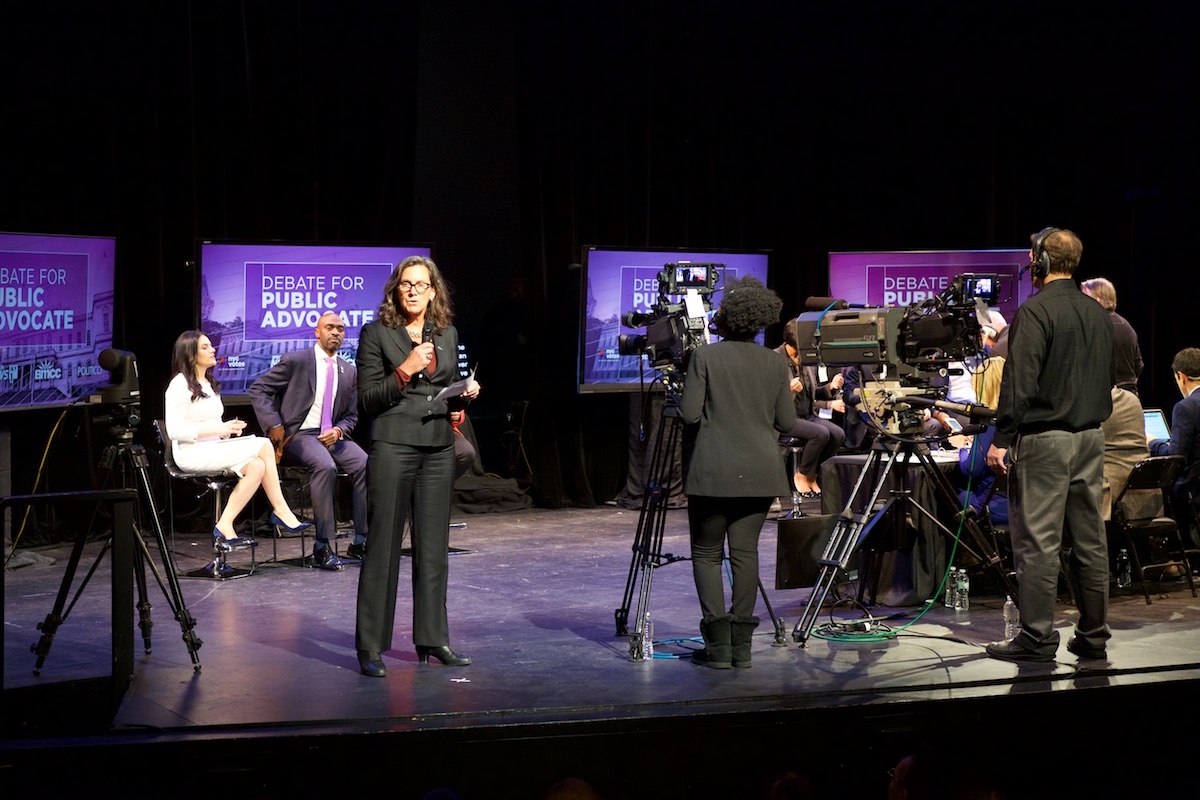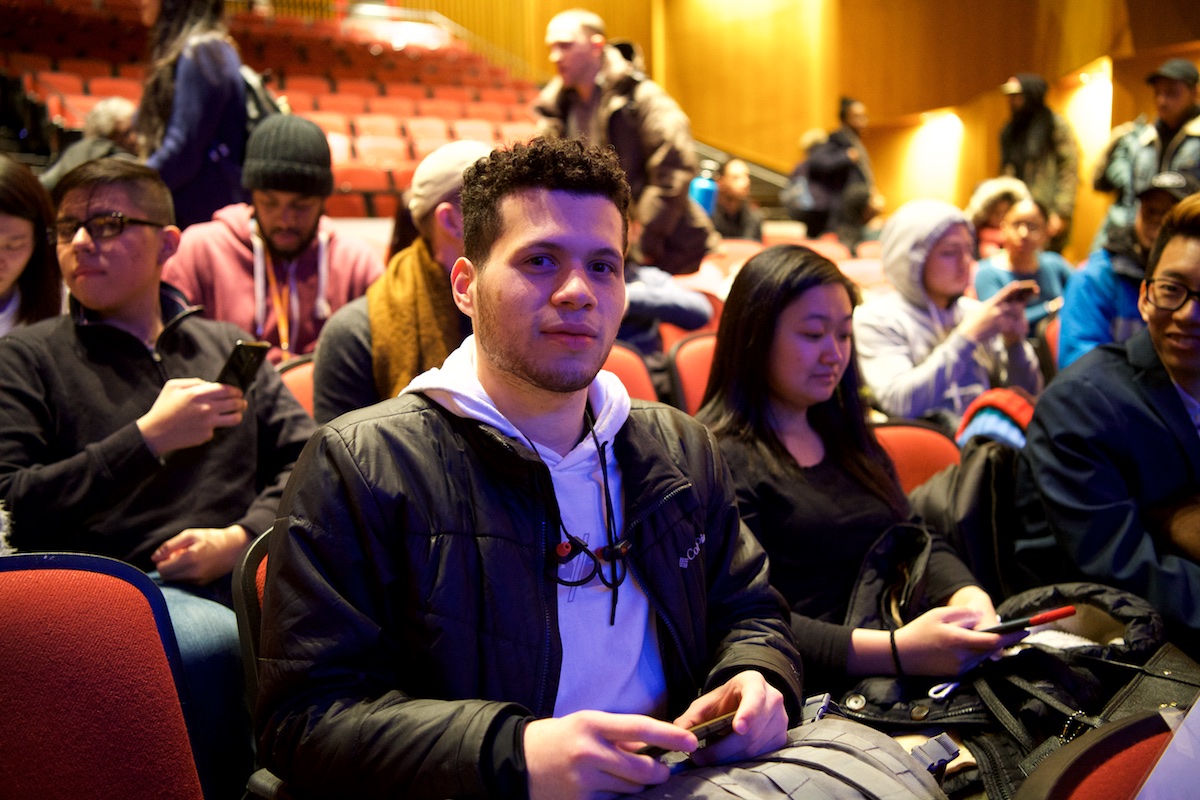
Borough of Manhattan Community College (BMCC/CUNY) hosted a political debate between the seven candidates running to be the city’s next public advocate on February 20 in Theater One at 199 Chambers Street. More than 250 students, faculty and staff registered to attend the event which was broadcast live on Spectrum NY1 beginning at 7 p.m.—barely one week ahead of the February 26 city-wide special election.
BMCC Interim President Karrin Wilks told the audience and candidates that having the debate on the BMCC campus provides a unique opportunity for the college’s students, aligned with BMCC’s mission to prepare its graduates for lifelong learning and civic participation. Wilks thanked faculty and the students who were taking part in the event.
“Your participation in our democratic process is vital to the future, critical to advancing equity and social justice, and to ensuring that our great city is a place where everyone can thrive,” Wilks said in her welcoming remarks. “We look forward to a lively and informative debate.”
A lively informative debate
Moderated by NY1’s Errol Louis, the candidates—Michael Blake, Rafael Espinal Jr., Ron Kim, Nomiki Konst, Melissa Mark-Viverito, Dawn Smalls and Jumaane Williams—spent an hour and a half sparring over topics ranging from Amazon to affordable housing. BMCC students also submitted questions, including one about tuition costs at CUNY. Each of the candidates responded that they support free or reduced tuition.
Sponsored by New York 1, the event was presented in conjunction with the city’s Campaign Finance Board, Politico New York and several other co-sponsors.
Several BMCC students worked throughout the day assisting the NY 1 technical crew and later assisted the candidates backstage before and after the broadcast. Students from an English course in journalism were invited to the ‘spin room’—where candidates or representatives spoke further with reporters after the debate ended.
The event was also live-streamed into an overflow room at Richard Harris Terrace, which is where criminal justice Professor Michelle Ronda and students from her Criminal Justice and the Urban Community writing intensive course watched.
Ronda’s class examines the implications of urban crime and justice as it relates to social policy.
“I’ve asked my students to pay close attention to any mention of criminal justice reform from the candidates,” said Ronda.
The students were instructed to take notes and incorporate the information into their semester-long research projects that explore crime and justice in their own neighborhoods.
Gender and women’s studies Professor Brianne Waychoff who attended with several of her students said civic engagement is especially important in today’s political climate. She said many of her students belong to one or more marginalized groups impacted by the issues the candidates would discuss.
“I teach students about gender justice from an intersectional point of view and the many avenues we can use to try to achieve it. Political engagement is one important type of activism,” said Waychoff.

Students engaged by issues discussed in debate
After the debate, a group of Waychoff’s students said they had a better understanding of the role of public advocate, and planned to do diligent research on the candidate’s stated issue positions.
“They answered a number of questions, but I came out of this more curious than before,” said Dustin Sfader, a student in Waychoff’s class.
Kaneita Marcelin agreed but said she appreciated the way a few of the candidates spoke from places of authenticity, in particular about housing and homelessness.
“I take the train every day and see, homeless people, some who are mentally ill, that’s an important issue for me,” she said.
Marcelin’s classmate Celeste Carrasquillo agreed that housing was her number one issue.
“My mom passed away a few years ago, and I’ve had to work and struggle at CUNY and in my housing situation. So when they talked about AirBnB and its impact on the affordable housing market, I realized these are really important issues we need to understand because they impact our day to day lives,” said Carrasquillo.
Ethnic Studies Professor Sheldon Applewhite attended the debate with students from his class—The Black Man in Contemporary Society. The class explores issues central to the public advocate debate, such as housing, education opportunities for low income people, the school to prison pipeline and police enforcement tactics.
“I have always believed it’s important for students to engage in the political process and one of the best way to do that is to learn about the candidates running for a particular office,” said Applewhite.
Two of his students, Vanessa Hawkins and Gene Watt, said debates such this one foster the democratic process, and after attending, they too plan to research each of the candidates more closely before voting.
“The public advocate’s job is underrated, the public advocate speaks for people who don’t have a voice,” said Hawkins after the debate had concluded.
Hawkins said she knew people who worked in homeless shelters and has heard about the tremendous obstacles those individuals face when they attempt to secure affordable housing.
“Being here tonight opened my eyes. I need to do more. Where do I start,” she said.
Watt said events such as the debate, will likely inspire students and young people to get involved in the voting process.
“We need full voter participation because as the voting base gets bigger, we have a better society,” he said.
BMCC’s director of government and community relations, Doug Israel said bringing the debate to BMCC provided the college an opportunity to encourage greater civic engagement on campus and to get students excited about being a part of political process.
“We are also thrilled with the great student turnout and the fact that that the debate generated such an enthusiastic response from our students and faculty.”
STORY HIGHLIGHTS
- Event was broadcast live on Spectrum NY1
- Faculty and students learn about the role of NYC public advocate
- Students say candidates spoke to issues they care most about

